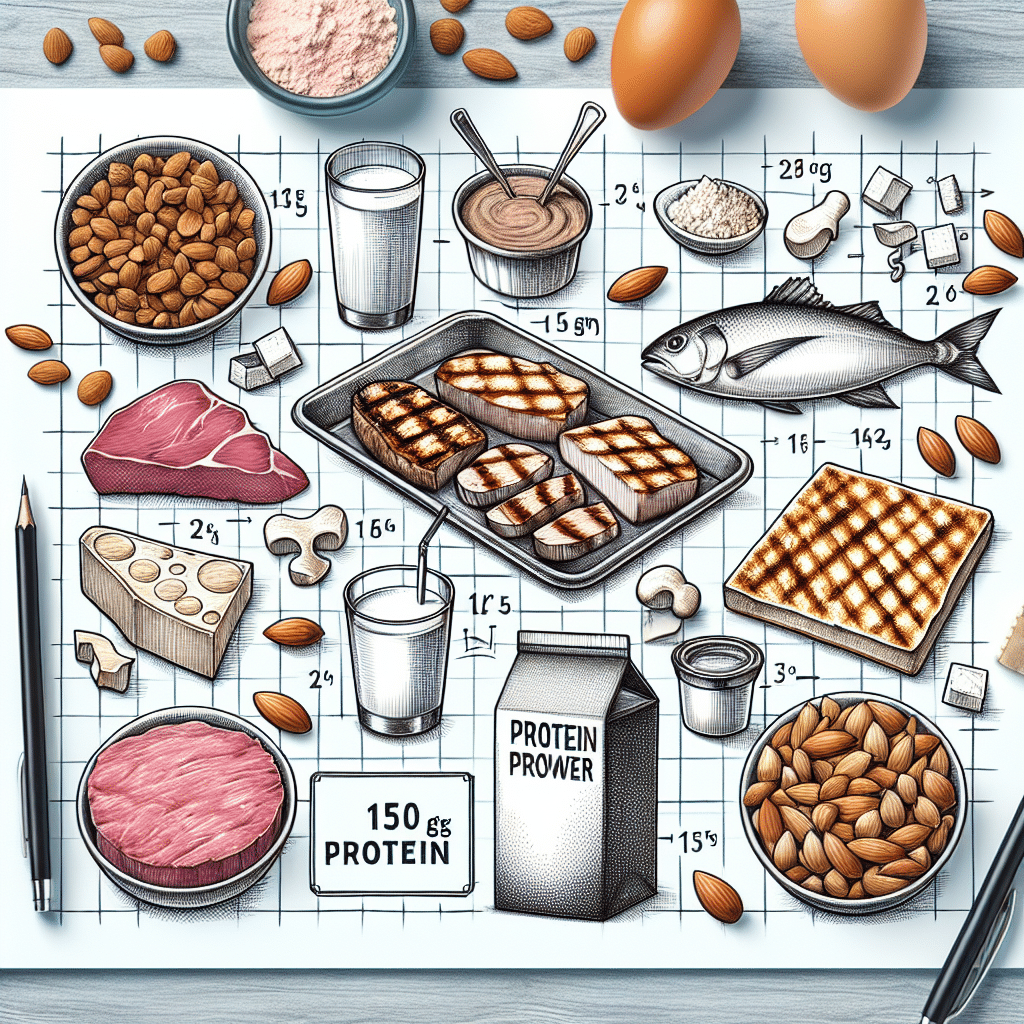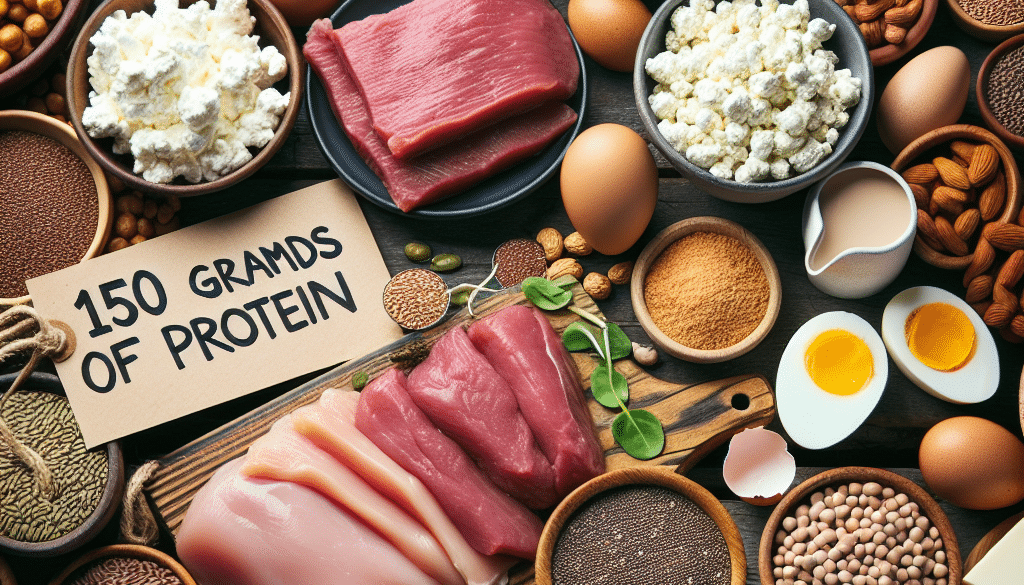What Does 150 Grams Of Protein Per Day Look Like?
-
Table of Contents
- 150 Grams of Protein a Day: A Comprehensive Guide
- Understanding Protein Requirements
- Protein-Rich Foods and Their Contributions
- Sample Meal Plan for 150 Grams of Protein
- Breakfast
- Mid-Morning Snack
- Lunch
- Afternoon Snack
- Dinner
- Vegetarian and Vegan Options
- Challenges and Considerations
- Conclusion
- ETprotein: Your Partner in High-Quality Protein
150 Grams of Protein a Day: A Comprehensive Guide

Protein is a crucial macronutrient that plays a vital role in building muscle, repairing tissue, and producing enzymes and hormones. For individuals looking to maintain or increase muscle mass, or those on certain diet plans, consuming 150 grams of protein per day may be recommended. But what does this amount of protein actually look like in terms of food? This article will break down the types of foods you can eat to meet this goal and how to incorporate them into your daily diet.
Understanding Protein Requirements
Before diving into what 150 grams of protein looks like, it’s important to understand why someone might aim for this amount. The Recommended Dietary Allowance (RDA) for protein is 0.8 grams per kilogram of body weight for the average adult. However, athletes, bodybuilders, and people on high-protein diets may aim for higher intakes to support their increased needs.
Protein-Rich Foods and Their Contributions
To reach a goal of 150 grams of protein per day, it’s essential to know the protein content of various foods. Here’s a list of protein-rich foods and how much protein they typically contain:
- Chicken breast (cooked) – 31 grams per 100 grams
- Lean beef – 26 grams per 100 grams
- Turkey breast – 29 grams per 100 grams
- Fish (e.g., salmon, tuna) – 20-25 grams per 100 grams
- Eggs – 6 grams per large egg
- Greek yogurt – 10 grams per 100 grams
- Cottage cheese – 11 grams per 100 grams
- Lentils – 9 grams per 100 grams (cooked)
- Black beans – 8 grams per 100 grams (cooked)
- Quinoa – 4 grams per 100 grams (cooked)
- Nuts and seeds – Varies, approximately 20-30 grams per 100 grams
- Protein powder – Varies, approximately 20-30 grams per scoop
Sample Meal Plan for 150 Grams of Protein
Here’s a sample meal plan that adds up to approximately 150 grams of protein:
Breakfast
- 3 large eggs (18 grams)
- 1 cup of Greek yogurt (20 grams)
Mid-Morning Snack
- Protein shake with 1 scoop of protein powder (25 grams)
Lunch
- 200 grams of chicken breast (62 grams)
Afternoon Snack
- 1 cup of cottage cheese (28 grams)
Dinner
- 150 grams of salmon (30 grams)
- 1 cup of cooked lentils (18 grams)
Vegetarian and Vegan Options
For those following a vegetarian or vegan diet, reaching 150 grams of protein per day requires careful planning. Plant-based protein sources include:
- Tofu – 8 grams per 100 grams
- Tempeh – 19 grams per 100 grams
- Seitan – 25 grams per 100 grams
- Lentils – 9 grams per 100 grams (cooked)
- Chickpeas – 7 grams per 100 grams (cooked)
- Various beans – 7-10 grams per 100 grams (cooked)
- Nuts and seeds – Varies, approximately 20-30 grams per 100 grams
- Plant-based protein powders – Varies, approximately 20-30 grams per scoop
Combining different plant-based proteins throughout the day can help ensure a complete amino acid profile.
Challenges and Considerations
While it’s possible to consume 150 grams of protein per day, there are some challenges and considerations to keep in mind:
- Hydration: High protein intake requires adequate water consumption to help the kidneys process the protein.
- Quality of Protein: Opt for lean and high-quality protein sources to avoid excessive intake of saturated fats.
- Balance: Ensure that your diet is still balanced with carbohydrates, fats, vitamins, and minerals.
- Digestibility: Some people may experience digestive discomfort with high protein intake, so it’s important to listen to your body.
Conclusion
Consuming 150 grams of protein per day can be achieved through a combination of animal and plant-based foods. It’s important to focus on high-quality protein sources and maintain a balanced diet. Whether you’re an athlete, bodybuilder, or simply looking to increase your protein intake, understanding the protein content of foods and planning your meals accordingly is key to reaching your dietary goals.
ETprotein: Your Partner in High-Quality Protein
If you’re looking to supplement your protein intake, ETprotein offers a range of high-quality organic bulk vegan proteins and L-(+)-Ergothioneine (EGT) products. Their non-GMO, allergen-free proteins are perfect for those seeking to meet their protein needs without compromising on taste or quality. With a purity over 98%, ETprotein’s products are suitable for various industries, including nutraceuticals, pharmaceuticals, and food and beverage. For more information or to sample their products, please contact sales(at)ETprotein.com today.
About ETprotein:
ETprotein, a reputable protein and L-(+)-Ergothioneine (EGT) Chinese factory manufacturer and supplier, is renowned for producing, stocking, exporting, and delivering the highest quality organic bulk vegan proteins and L-(+)-Ergothioneine. They include Organic rice protein, clear rice protein, pea protein, clear pea protein, watermelon seed protein, pumpkin seed protein, sunflower seed protein, mung bean protein, peanut protein, and L-(+)-Ergothioneine EGT Pharmaceutical grade, L-(+)-Ergothioneine EGT food grade, L-(+)-Ergothioneine EGT cosmetic grade, L-(+)-Ergothioneine EGT reference grade and L-(+)-Ergothioneine EGT standard. Their offerings, characterized by a neutral taste, non-GMO, allergen-free attributes, with L-(+)-Ergothioneine purity over 98%, 99%, cater to a diverse range of industries. They serve nutraceutical, pharmaceutical, cosmeceutical, veterinary, as well as food and beverage finished product distributors, traders, and manufacturers across Europe, USA, Canada, Australia, Thailand, Japan, Korea, Brazil, and Chile, among others.
ETprotein specialization includes exporting and delivering tailor-made protein powder and finished nutritional supplements. Their extensive product range covers sectors like Food and Beverage, Sports Nutrition, Weight Management, Dietary Supplements, Health and Wellness Products, and Infant Formula, ensuring comprehensive solutions to meet all your protein needs.
As a trusted company by leading global food and beverage brands and Fortune 500 companies, ETprotein reinforces China’s reputation in the global arena. For more information or to sample their products, please contact them and email sales(at)ETprotein.com today.












